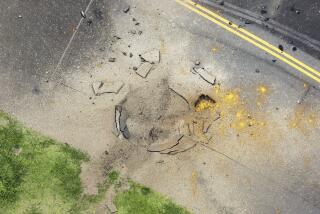Tokyo Bomb Injures 1 at Protest Site
- Share via
TOKYO — A bomb went off early today in a downtown Tokyo park where a radical group planned to demonstrate later in the day in opposition to celebrations marking the 60th anniversary of Emperor Hirohito’s ascent to the throne.
One man was seriously injured in the explosion, which took place in a public toilet in the park. A police spokesman said the man may have been trying to set the device when it blew up.
The police spokesman said it was not clear whether the man was connected with the small, ultraleftist Revolutionary Workers’ Council, one of many groups that have vowed to disrupt both the emperor’s 60th anniversary celebrations and the seven-nation economic summit meeting beginning Sunday, which President Reagan will attend.
The Revolutionary Workers’ Council had notified police that it intended to stage an anti-Hirohito rally at the park.
Over 200 Ultraleftist Groups
There are between 200 to 300 ultraleftist groups in Japan, many of whose 35,000 members subscribe to theories of violent worldwide revolution. The groups call Hirohito a war criminal and have denounced the government-sponsored ceremony to celebrate the beginning of his reign as an attempt to turn back the clock to the pre-World War II period when the emperor was considered a god.
According to reports in the Japanese media, one of the extremist groups was planning to attack a golf course frequented by Prime Minister Yasuhiro Nakasone, while another had considered sabotaging Japan’s 120-m.p.h. bullet trains by dropping automobiles on the tracks from roads that pass above the train line.
The Japanese government has taken unprecedented measures to assure security during both today’s ceremony and the three-day summit.
$40 Million in Equipment
Brand-new helicopters, bulletproof limousines and nearly $40-million worth of computer equipment to trace license numbers of suspicious cars are just part of the police arsenal against terrorism.
But in spite of the summit-related mobilization of about 30,000 police in Tokyo, radical groups have staged increasingly bold attacks against public buildings, the Imperial Palace, the U.S. Embassy and an American air base not far from Tokyo.
On March 31, members of the Workers’ Council launched home-made rockets that landed inside the grounds of Tokyo’s ornate state guest house, where Prime Minister Nakasone, Reagan and the leaders of Britain, France, West Germany, Italy and Canada are to discuss economic problems and how to combat terrorism.
Rockets that landed inside Hirohito’s palace March 25 were launched from a spot directly in front of a police station, while today’s explosion took place within yards of the Japanese Defense Agency, an area that normally is heavily patrolled.
30,000 Police on Duty
Starting in early March, 12,000 police have been stationed throughout the Japanese capital in anticipation of pre-summit attempts at sabotage. As of last week, the number of policemen swelled to 30,000, the largest for any event in Japan so far.
Within hours of today’s explosion, thousands of policemen set up roadblocks in a wide area around the park. Police cordoned off streets around the area, and patrol cars, lights flashing, were parked at one-block intervals for close to a mile in any direction.
In recent days, police have searched an area surrounding the sumo wrestling stadium where the imperial anniversary ceremony is scheduled, using dogs specially trained to sniff out explosives.
Despite inconveniences, most Japanese are cooperating quietly with police precautions, although one newspaper described Tokyo as being under a “state of siege.”
Other developments on terrorism-related subjects, as reported by wire services:
--In Beirut, Abu Nidal’s terrorist group claimed that its men killed a British tourist, Paul Appleby, 28, of Bristol, in Jerusalem on Sunday in retaliation for British support for the U.S. air raid on Libya two weeks ago.
The claim came in a typewritten statement delivered to a foreign news agency in Beirut and was signed by Abu Nidal’s Fatah Revolutionary Council.
--In Ankara, a Turkish court issued arrest warrants for three Libyans, two of them employees of the Libyan mission, in connection with an attempt to bomb a U.S. officers’ club April 18. State security court prosecutor Ulku Coskun said that when two suspects were arrested near the club, they were carrying a bag containing six hand grenades that had been brought into Turkey under cover of diplomatic immunity.
--In West Berlin, a judge ordered the continued detention of a Palestinian, Ahmed Nawaf Mansur Hasi, 35, in connection with the April 5 discotheque bombing that killed two people, including an American soldier. By law, Hasi can be held up to six months without being formally charged, a Justice Ministry spokesman said.
More to Read
Sign up for Essential California
The most important California stories and recommendations in your inbox every morning.
You may occasionally receive promotional content from the Los Angeles Times.













